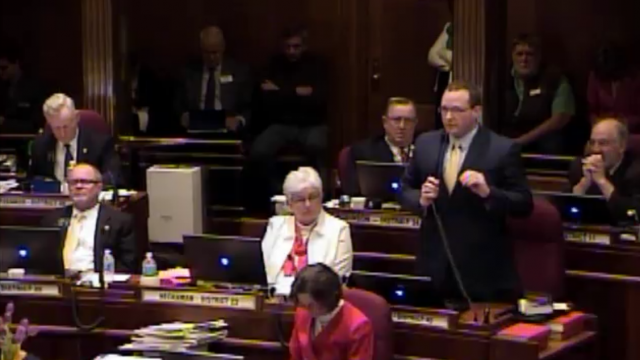Video: North Dakota Senate Passes Oil Tax Reform Bill

It was a large video file to upload so it may be a couple of minutes before it appears
After roughly three hours of debate, during which Senate Democrats worked to wring every possible drop of political theater out of the proceedings, the state Senate tonight passed an oil tax reform bill as amended in committee. The vote was 32-15, with Democrat David O’Connell of Lansford making the support for the bill bipartisan. Senator Tim Flakoll (R-Fargo) helped the Democrats make the opposition bipartisan.
If the House concurs (and from what I’m hearing they will) a raft of triggers in exemptions in the state’s existing oil tax code – including the much-talked-about “big trigger” which could possibly eliminate the extraction tax entirely on June 1st – will be replaced with a 10 percent flat tax which triggers up to an 11 percent flat tax if oil is above $90 per barrel (indexed to inflation) for three months.
The debate was beyond heated. Within the first few minutes a visibly angry Senate Minority Leader Mac Schneider had to be warned by Lt. Governor Drew Wrigley (who presides over the Senate) about attacking Majority Leader Rich Wardner personally. That was just one of four times Wrigley had to remind Democrats to stay on topic with the debate as they were all grandstanding for the news media cameras in the room. In fact, both party leaders had to be summoned to the front of the chamber for a side bar at one point when an endlessly pontificating Senator George Sinner (D-Fargo) rose at about the three hour mark to start in yet another diatribe about the history of this tax. Senate Majority Leader Rich Wardner objected, and Sinner was told to get back on point.
[mks_pullquote align=”right” width=”300″ size=”24″ bg_color=”#000000″ txt_color=”#ffffff”]If the House concurs a raft of triggers in exemptions in the state’s existing oil tax code – including the much-talked-about “big trigger” which could possibly eliminate the extraction tax entirely on June 1st – will be replaced with a 10 percent flat tax which triggers up to an 11 percent flat tax if oil is above $90 per barrel (indexed to inflation) for three months.[/mks_pullquote]
Senator Erin Oban (D-Bismarck) told the Senate floor that the “people are not for this.” I thought I could hear a few chuckles from the floor (maybe not) when she said that. If people were laughing it wouldn’t be hard to understand why given that Oban has been an elected member of the Legislature for about six months and belongs to a political party that doesn’t hold a single statewide office and hasn’t held a majority in either house of the Legislature in more than 20 years.
So, you know, she’s a very reliable source on what the people do and do not want.
The debate was also replete with procedural maneuvering. There were no fewer than three floor amendments offered to the bill by Democrats, which were all rejected, and the bill was also divided to exclude the reduction in the tax rate.
The division also failed.
If I could put the Democrats’ argument against this bill in a nutshell, it is the idea that the state is “giving away” money by exchanging the oil tax exemptions and triggers for a flatter and slightly lower rate. Which is nonsense for a couple of reasons.
First, the money does not belong to the state. The money belongs to the private sector people who earn it. The state should tax in a fashion that supplies it with what is needed to do the people’s business. We should not be in the habit of taxing simply to maximize revenues, which is what the Democrats want.
Second, I’m not sure anyone really knows if there’s any money being given away given how uncertain oil prices are. The “big trigger” could hit on June 1st and stay in place for a decade, meaning that this bill would actually create more revenue for the state. Or maybe the “big trigger” doesn’t hit at all, meaning this bill would lower revenues. But the point is, nobody knows.
Not Democrats. Not Republicans. Not the oil industry executives or the investment gurus. Thus the necessity of a flat and predictable tax.
I wish I could say that Democrats were arguing these point from a place of conviction, but I don’t think they were. I think they were arguing these points as a thoroughly marginalized minority party desperate for anything they can maybe turn into a few more votes at the polls.
Update: Here’s audio of Scott Hennen interviewing Flakoll about his no vote shortly after he cast it. He does not sound like a man who is confident in his position.




